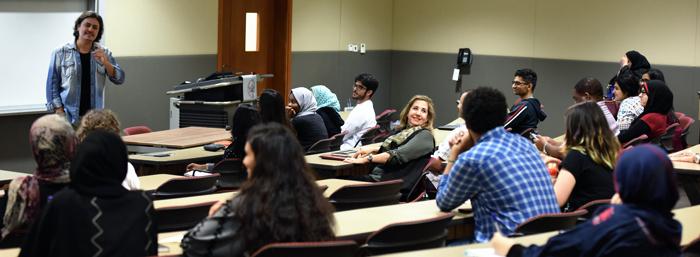- About
- Admissions
- Study at AUS
- Prospective Students
- Bachelor's Degrees
- Master's Degrees
- Doctoral Degrees
- Admission Publications
- International Students
- Contact Admissions
- Grants and Scholarships
- Sponsorship Liaison Services
- Testing Center
- New Student Guide
- File Completion
- New Student Orientation
- Payment Guide
- Executive Education
- Students with Disabilities
- Academics
- Life at AUS
- Research
- Contact Us
- Apply Now
- .

AUS workshop explains the psychology of bad driving
Overestimating personal driving skills and a fake sense of security are among the leading causes of bad driving habits, according to the Psychology of Bad Driving workshop held at American University of Sharjah (AUS) on Tuesday, March 1, 2016.
Dr. Anatoliy Kharkhurin, Associate Professor of Psychology at AUS, explored the psychological factors that may lead to bad driving habits. His presentation was part of the AUS Road Safety Awareness campaign, which started on Sunday, February 28, 2016.
The presentation focused on the principles of driving psychology as Dr. Kharkhurin highlighted different psychological factors that affect drivers' actions and reactions.
A false sense of security where drivers believe they are safer than they really are was mentioned as one of the main factors, which causes drivers to be less careful. Dr. Kharkhurin also argues that drivers tend to overestimate their driving skills and have the illusion that they control how others drive.
According to Dr. Kharkhurin, other factors include aggression, where drivers fail to realize that they are being aggressive. He stated that the younger a driver is, the more aggressively they tend to drive. Also, Dr. Kharkhurin explained that drivers tend to dehumanize other drivers and pedestrians in ways they wouldn't when interacting in person.
More factors were introduced during the presentation and included the belief that drivers can see everything happening around them, which ultimately causes many accidents.
The workshop aimed to raise the awareness of AUS students and explain that our driving decisions and actions express our personality style and character.
The AUS Road Safety Awareness week will also include the presentation "Are You an Emotionally Intelligent Driver?" by Dr. Rana Raddawi, Associate Professor, Department of English and AUS Faculty Senate President, on March 2, 2016.
The university's first Road Safety Awareness Week was launched by AUS Chancellor Dr. Björn Kjerfve on Monday, with the primary mission to change the behavior and attitudes of reckless drivers.
The campaign has been organized by the AUS Faculty Senate, on the occasion of the GCC Road Safety Week. It will run until March 3, 2016. Chancellor Kjerfve opened the week with a welcome speech stressing the importance of road safety awareness. Speaking on the occasion, Dr. Rana Raddawi, President of Faculty Senate, pointed out that the campaign has been initiated this year in collaboration with the administration, academic units and the university's Office of Student Affairs.
The program aims to promote road safety among all members of the campus community, as well as among visitors, such taxi and bus drivers and delivery drivers. The program emphasizes the importance of starting with education and is designed to be sustainable, with a road safety-themed event every year.
The campaign panel included members of the Sharjah Police; ER and trauma doctors; the AUS Safety and Security officers; as well as a student, who discussed issues related to road safety and helped AUS community members have a better understanding of safety regulations and measures. A number of videos will be shown throughout the week that will feature a filmed visit to victims of car accidents, testimonial and informative videos about road safety on campus.

